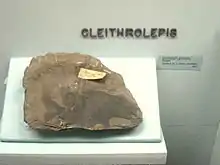Cleithrolepis
Cleithrolepis is an extinct genus of ray-finned fish from the Triassic.
| Cleithrolepis Temporal range: Early Triassic | |
|---|---|
 | |
| Scientific classification | |
| Kingdom: | |
| Phylum: | |
| Class: | |
| Order: | |
| Family: | Cleithrolepididae |
| Genus: | Cleithrolepis Grey Egerton, 1864 |
The genus grew to about 30 centimetres (12 in) long. It had a weak lower jaw with teeth only at the tip.[1]
Cleithrolepis lived in rivers, billabongs and lakes in the large braided river system that deposited the Hawkesbury Sandstone in what is now New South Wales, with fossils found in shale lenses within the sandstone.[2]
References
- Fossils (Smithsonian Handbooks) by David Ward (Page 213)
- "Archived copy". Archived from the original on 2009-10-14. Retrieved 2009-10-28.CS1 maint: archived copy as title (link)
External links
- Fossil of freshwater fish, Cleithrolepis granulata - Somersby, New South Wales, Middle Triassic, 240 million years ago.
This article is issued from Wikipedia. The text is licensed under Creative Commons - Attribution - Sharealike. Additional terms may apply for the media files.